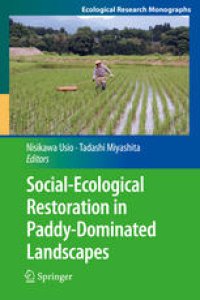
Ebook: Social-Ecological Restoration in Paddy-Dominated Landscapes
- Tags: Ecosystems, Environmental Management, Applied Ecology, Agriculture, Conservation Biology/Ecology, Sustainable Development
- Series: Ecological Research Monographs
- Year: 2014
- Publisher: Springer Japan
- Edition: 1
- Language: English
- pdf
With a focus on environmentally friendly rice farming, this unique book integrates both ecosystem and human dimensions of ecological restoration to provide strategies to promote sustainable agriculture and rural development. Paddy fields have multiple functions beyond their role of producing rice: They serve as refuge habitats for a range of wildlife that once inhabited floodplain wetlands and contain a number of unique and threatened aquatic species. They also provide various ecosystem services for regional communities such as water retention, erosion control, flood control, fish culture, and educational opportunities. However, rice paddies are threatened worldwide due to the modernization of agriculture and abandonment of farmland caused by depopulation and the aging of rural communities. Therefore, multiple ecological and sociological aspects must be considered in the ecological restoration of paddy fields. This book aims to do so by incorporating various disciplines of natural and social sciences. Strategies for sustainable agriculture are reviewed, including financial incentives for farmers and the use of flagship wildlife species such as the crested ibis (toki) to promote ecological restoration. With the increasing popularity of environmentally friendly rice farming in parts of Asia and the western United States, this book offers model cases for sustainable management of paddy-dominated landscapes.
With a focus on environmentally friendly rice farming, this unique book integrates both ecosystem and human dimensions of ecological restoration to provide strategies to promote sustainable agriculture and rural development. Paddy fields have multiple functions beyond their role of producing rice: They serve as refuge habitats for a range of wildlife that once inhabited floodplain wetlands and contain a number of unique and threatened aquatic species. They also provide various ecosystem services for regional communities such as water retention, erosion control, flood control, fish culture, and educational opportunities. However, rice paddies are threatened worldwide due to the modernization of agriculture and abandonment of farmland caused by depopulation and the aging of rural communities. Therefore, multiple ecological and sociological aspects must be considered in the ecological restoration of paddy fields. This book aims to do so by incorporating various disciplines of natural and social sciences. Strategies for sustainable agriculture are reviewed, including financial incentives for farmers and the use of flagship wildlife species such as the crested ibis (toki) to promote ecological restoration. With the increasing popularity of environmentally friendly rice farming in parts of Asia and the western United States, this book offers model cases for sustainable management of paddy-dominated landscapes.